- Home
- Adam Thorpe
Flight
Flight Read online
Contents
Cover
About the Book
About the Author
Also by Adam Thorpe
Title Page
Epigraph
Part One
Chapter 1
Chapter 2
Chapter 3
Chapter 4
Chapter 5
Chapter 6
Chapter 7
Chapter 8
Chapter 9
Chapter 10
Part Two
Chapter 1
Chapter 2
Chapter 3
Chapter 4
Chapter 5
Chapter 6
Chapter 7
Chapter 8
Chapter 9
Acknowledgements
Copyright
About the Book
Bob Winrush used to fly passengers, then worked for years as a ‘freight dog’, flying consignments of goods and sometimes people to all the corners of the world – including bush-strips in war zones: ‘real flying,’ as he called it. Until, one day, he walked away from a deal that didn’t smell right – something a freight dog should never do.
Now working as a private pilot for an Emirate prince in Dubai, he finds that moment of refusal catching up with him. Caught between those who want to find out more and those who want to cover their traces, he becomes a marked man, and flees to a remote Scottish island. Pursued by both armed assassins and a ruinous, bitter divorce, he struggles to re-fashion himself in this barren, beautiful place, taking on another identity.
But back in the world of smuggled AK-47s and heroin, the stakes are rising. Despite the presence of Judith, the alluring environmentalist, memories of his uglier flights return to haunt him. Even in the furthest Hebrides his past is with him, and the predators are closing in.
Adam Thorpe’s tenth novel is an extraordinary amalgam: a vertiginous, page-turning thriller and a masterful work of literary fiction. Fast, funny and very frightening, Flight shows a new facet of this most brilliant of writers.
About the Author
Adam Thorpe was born in Paris in 1956. His first novel, Ulverton, was published in 1992, and he has published two books of stories and six poetry collections – most recently Voluntary. His new translation of Madame Bovary has just been published by Vintage. He lives in France with his wife and family.
Also by Adam Thorpe
FICTION
Ulverton
Still
Pieces of Light
Shifts
Nineteen Twenty-One
No Telling
The Rules of Perspective
Is This The Way You Said?
Between Each Breath
The Standing Pool
Hodd
POETRY
Mornings in the Baltic
Meeting Montaigne
From the Neanderthal
Nine Lessons from the Dark
Birds with a Broken Wing
Voluntary
TRANSLATION
Madame Bovary
The impression left after watching the motions of birds is that of extreme mobility – a life of perpetual impulse checked only by fear.
Richard Jefferies
Part One
1
IF YOU’RE HAVING an affair with a freight dog’s wife, you should check the world’s weather.
A final flight to Zambia was cancelled because of flash floods: the airport runway and all alternatives round about were rendered unusable. It was Bob’s last haul for that trip, which had been the usual mixture of things, although the last few days had been toing and froing for Glencore with machinery for the copper belt. He came home two days early, not warning his wife so he could surprise her – even finish tiling the bathroom, fix the outdoor light, mow the lawn. He was looking forward to it.
Then he remembered that Olivia wouldn’t be at home until early evening. The twins, of course, were away at school. He hated them boarding – nothing to do with the considerable cost – but it was her decision. Worcester, she claimed, was mostly obesity in cheap jeans and there was some sort of serious drugs ring: at fifteen, the kids had begun to have dodgy friends.
So he had a couple of hours in which to shower, nap, find his land legs. He was glad. He smelt of sulphur from the strip mine at Mufulira, the wind blowing southerly over the town and its scratch airport. The acid gas from the smelter was still in his mouth. He was glad the rains had come.
It was the mid-afternoon of a cloudless and cold October day, mulch and woodsmoke nipping the air, as unmistakeably English as an old churchyard. The ancient mill-house, modified for the twenty-first century, seemed braced for another thousand years under its fresh thatch (and so it ought to have been, if expense was anything to go by).
He closed the car boot and took a slow breath, filling his lungs. It took longer, these days, for the ground to settle. The country air felt deliciously damp and green after the dryness of the cockpit, from which he’d barely emerged except to sleep. Home is sweet and silky, he thought. Home is good. Celandine House. Olivia’s idea, the name. Celandine all the way up the grassy approach track, before the council turned it into a runway for the posh new estate.
He crunched across the gravel drive, unlocked the door, planted his bag on the hall carpet.
An unfamiliar smell. No pets (the twins were allergic), so it was usually a mixture of fireplace, cinnamon from the carpet cleaner and Olivia’s fruity hairspray, with an underlying hint of hay-bale from the thatch. Now there was lavender. A lot of it, oily but pleasant. Olivia’s latest fad, no doubt. You could never smell much in a cockpit, but hours of being cooped up with his co-pilot’s armpits and Hugh ‘Al’ McAllister’s low-tide breath (not improving over the many years Al had been his loyal flight engineer) made him appreciative. And that last copper town had been something else: sewage, sulphur and slag dust.
‘Asthmaville,’ Al had shouted over the unloading, eyes as red as a ghoul’s, wheezing horribly. ‘I’ll sue Glencore for millions!’
You never know what you’ll find at the other end.
He heard sobs from upstairs, was only surprised for a moment: the telly was left on for security purposes when there was no one in. Some emoting afternoon soap. Or perhaps tennis, without the knock-knock of the ball. Just the grunts.
A nature documentary, he realised, as he poured himself a glass of mineral water out of the fridge: peculiarly like the moans and screeches of the equatorial forest he’d spent the first part of the trip flying into – the landing strip like a dropped pin on a rug, somehow rotating to a scar wide enough for your considerable wingspan. Bump squeak bump. A testing time for the landing gear. Then he remembered it was early-closing day, which Olivia’s boutique was unusual in honouring. It was part of her class act.
He climbed the stairs and opened the bedroom door. When it comes to emergencies, a pilot’s reaction time is faster than other people’s: the seconds break their own rules, slow down, become brown and viscous. Otherwise pilots are dreamier than most. This is why it took Bob Winrush a long moment – really, a split second – to recognise that his wife, crouched stark naked on their double bed, was not examining her own feet. She was gripping the feet like a pair of throttles, while a pair of shiny-knuckled hands covered her breasts from behind. They were not her hands, she didn’t have four arms: the broad nails were clipped to the pink, the wrists were thick. And her own legs were not stretched out in front of her, but tucked up either side; the legs in front of her were someone else’s, swirled with dark hair, a tuft on the bridge of each big toe.
She was frozen in shock, staring back at Bob. Or would have been frozen, if her moaning partner hadn’t continued to rock her up and down. The room was heady with lavender oil: Olivia’s neck, shoulders and clavicles were glossed,
as was her open lower lip and the tongue resting on it. There was a ball of tissue, grey with moisture, by the man’s shin. Her buttocks were on the man’s belly. It was all any old how.
At first she said, ‘Job. It’s his job.’ Then she reached for the duvet rucked at the bottom of the bed, pulling it up over her long body as if her husband had never seen her naked. She squeezed her eyes tight shut.
‘Oh shit,’ she said.
The rocking stopped and a shiny face appeared behind her shoulder, someone familiar to Bob. A neighbour. Luke, the therapeutic bilingual masseur. He lets you keep your bottoms on, Olivia had laughed, once, in the kitchen with her friends. Luke from Montreal.
‘You’ve not got your bottoms on,’ Bob heard himself say from high overhead.
Olivia’s dorsals were being pushed at by Luke as he wiggled his hips, prising himself out of her; Bob spoke through the slow viscosity of a split second and told him not to move, not a muscle.
‘Hey,’ Luke said. ‘Hey. Let me explain.’
‘Not right now,’ said Bob.
That was his own pillow those elbows were digging into: pale-blue John Lewis pillowslip, wedding present from his late aunt. He’d always been fussy about pillows, given his own scrunched internal clock. He pulled up a chair, the chair he’d drape clothes over when changing, and sat on it. If he hadn’t done so, he would have fallen down – the deck pitching and rolling, his heart enormous in his chest.
Olivia said, peeping out from the duvet, ‘Well? What now? Christ.’ She sounded annoyed, as if a teapot lid had been broken by his own careless hand. Really, though, Bob knew she was scared. The ex-stewardess, trained in first aid and all types of emergency.
‘Sustain velocity. Go right through it.’ He was trying to think. The impossible happening. Something you’d never been trained for.
‘It’s tantrism,’ she said. ‘A religion. A way of being part of the universe. Luke?’
Nothing came from Luke but a squeak, the beginnings of words. He coughed.
‘Energies,’ she went on. ‘This is the first time, ever. Ever.’
‘Said Josephine,’ Bob whispered. He didn’t mean it to be a whisper: just staying upright and functional was taking most of his strength, and he was a muscular, broad-shouldered man who kept in trim. He needed another glass of water: the acid fumes were filling his mouth. He was back on the runway at Mufulira, eyes watering, feeling sick, kids in torn shorts running about beyond the fence. ‘Said Johnson,’ he added, with a chuckle that was strange to him.
‘Truly, it is precisely that,’ Luke drawled. ‘Meaning a very ancient tradition, no barrier between physical and spiritual. About releasing energies? And one time is enough, truly.’ His voice trembled.
Bob looked at him properly at last. ‘That’s what we pilots say about birdstrikes: once is enough.’
‘This truly is not a birdstrike,’ said Luke. Then gave a little involuntary snigger.
‘Sucked in. The fan blades twisted. And that’s it.’
‘This is truly just really about healing.’
‘Those big bald-headed vultures are the worst,’ Bob added. His stare, augmented by a faint trembling of the head, was more effective than a fist. Luke looked up at the ceiling, his lips drawn back in a snarl.
‘Let’s get dressed, Bob, meet you downstairs for a chat,’ said Olivia, attempting her no-nonsense tone. Her eyes and nose were moist.
He was staggering about in the considerable debris field of his marriage, and all she wanted was a chat.
Luke twisted round, putting his weight on his one elbow, digging deeper into Bob’s pillow.
‘Don’t move. I won’t say it again. Once is enough.’
The man sank back, hand over his eyes.
‘Well,’ Bob continued, adopting the sing-song voice he’d use over the intercom back in his passenger days; ‘this is it. This is what I think. Listen. I think you should stay up here while I fix myself a stiff whisky, and we’ll go on from there, like grown-ups.’ Somewhere deep in his mind’s tangle, at the initial sight of Olivia’s buttocks pressed on another man’s belly, a tiny glowing valve of arousal had been switched on. He wanted to smash it.
‘Oh, Bob, good idea …’ Olivia sounded faintly relieved, which annoyed him.
He left them and went steadily, step by step, down the creaking and scarred oak stairs, using the banister. He could wrestle a pig of a plane through almost any storm without missing a heartbeat, but the worst usually happens when you least expect it.
He unzipped his bag by the front door and drew out the pistol, a battered Makarov with a notched wooden grip.
There was the sound of the bathroom latch dropping (each door having its own familiar acoustic), and he loped back up. Olivia stood alone in her underthings in the bedroom, shivering and saying something. He kicked the bathroom door open.
Luke’s glossy fingers were on the windowsill, next to the raw area of wall that Bob had been planning to tile. Then they vanished. Bob leapt to the window, forgetting to duck under the bathroom’s low beam, and saw the tantric healer slide off the outhouse roof below, to end up sprawled stark naked on his back in the hydrangea bed.
By the time Bob and his throbbing head had joined him by the conventional route, the man had managed to crawl some distance over the lawn. He had done something to his ankle, and his knees and hands were stained red with Worcestershire clay.
Catching sight of Bob, he curled up in a foetal position and sobbed into his knees. ‘Please, please, oh please, yow, oh Christ.’ He looked up, hopeful. ‘I’ve broken my ankle? Really bust it?’
The lawn’s grass was definitely on the long side. It needed cutting. Bob pointed the gun downwards and took aim.
It was a hinge moment, but he was already several hundred nautical miles ahead, thinking out the consequences.
He saw himself driving, driving north until he got to the very edge, then just carrying on.
He said, ‘If I ever see you near my wife again, your brain’ll be couscous.’
He went straight back to the house, rescued his bag, tried not to notice the twins’ photos here and there, thought about shooting up the kitchen, and drove away spitting gravel, after standing by the car and sending one bullet up into the clear blue sky. The shot was surprisingly loud. There was no sign of Olivia: he learnt later that she had stayed in the bedroom with the double bed pushed up against the door, and called the police.
2
HIS NAKED BODY glistened, sweat pooling in the hollow of each collarbone. He was down at the tail end of a converted DC-10, stuck on the tarmac in Roskilde while mechanics in hi-vis smocks replaced a valve on the starboard engine. The plane, en route between Paris and Dubai, belonged to an Emirati prince. As the crew were leaving the cockpit for a smoking-zone tour and to deal with the landing fees, His Excellency had invited the captain for a spell in the sauna. This was situated in the rear of the fuselage, working off ground power by special request.
It was a sleety winter dusk in Denmark. Bob left François, the co-pilot, to the tea and medals and followed Sheikh Ahmed down to the sauna at the aft end.
The two men were quite naked but for small white cotton towels around their midriffs. Bob had only ever seen the prince in his desert robes and tinted glasses, and was surprised by the enormity of his belly, the furriness of his chest, and the dark patches around his eyes, like bruises. For a man in his mid-thirties, he was in poor shape. Bob, on the other hand, prided himself on keeping in trim: he worked out, pulled weights, jogged.
They were uncomfortably close: the sauna was tiny, with the back wall stepped into a couple of benches, and so new there was resin oozing in gobs from the pinewood cladding. The air was an accurate rendition of Dubai’s in July and August. I must be mad, Bob thought.
No girls, which he’d been half-expecting. Just the plump prince and his sing-song drone, broken now and again by a lazy chuckle. Because of the misbehaving valve, they’d had no choice but to land at Roskilde, where the biggest runway is
barely 1800 yards. Not exactly an emergency, but the prince was impressed. Or maybe scared.
‘Piece of cake,’ Bob reassured him, adding that the complete conversion had added less than a ton to the aircraft and there were only twelve bodies on board, so it didn’t really matter if they were 3,000 feet short of tarmac. His Excellency had flown himself, taking lessons on a brand-new Grumman Tiger he’d received on his eighteenth birthday back in the early 1990s, between educational stints at Wellington and Cambridge. But he ran off the runway somewhere after a gust caught him from behind, the aircraft flipping over when the nose landing gear collapsed. This had clipped his wings, he joked.
He leaned forward, indicating the scars on his face; Bob had always thought they were acne trails. The prince wanted to know what the DC-10’s reputation was among pilots.
Death Cruiser 10.
‘Fairly viceless. FedEx bought a lot of the old fleet off American and United Airlines, which says it all.’
They also talked football while their faces glistened. Apart from his home team in the Emirates, the prince supported Chelsea. In fact, he wanted to buy it. Bob was more a cricket man, but kept up his end well enough, if only to please. At fifty-one, he didn’t fancy being thrown upon the shrinking aviation job market, or not in his previous capacity as a freight dog: apart from anything else, he’d end up in the usual hot water. Saunas may be hot, but they don’t scald. His Excellency threw a splash from the jug onto the false coals and Bob had to close his eyes against the rush of steam. When he opened them again, his employer was smiling strangely.
‘Captain Windrush. Captain Windrush. Is this really your name? It sounds like a Frederick Forsyth novel.’
‘I once met an interior designer by the name of A. M. Gay.’
This made Sheikh Ahmed laugh out loud, teeth very white against the black beard.
‘Actually,’ Bob went on, ‘it’s Winrush. Without the d. For future reference.’
‘I know, I know. I employ thousands. Our good old teachers remembered all our names at Wellington, except for mine, which they pronounced completely wrong! You know why we are meeting in the sauna?’

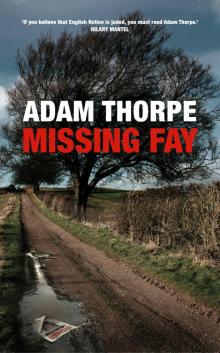 Missing Fay
Missing Fay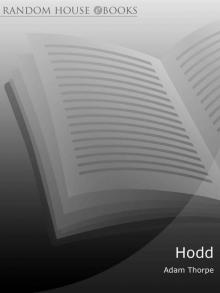 Hodd
Hodd Pieces of Light
Pieces of Light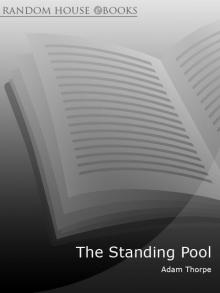 The Standing Pool
The Standing Pool Ulverton
Ulverton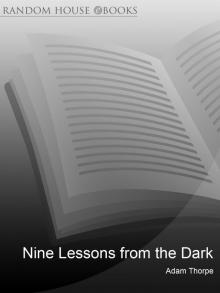 Nine Lessons From the Dark
Nine Lessons From the Dark Flight
Flight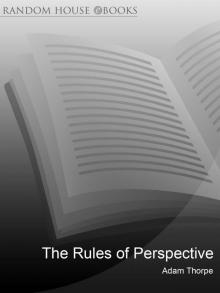 The Rules of Perspective
The Rules of Perspective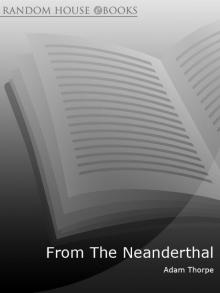 From the Neanderthal
From the Neanderthal Is This the Way You Said?
Is This the Way You Said?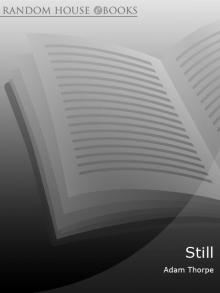 Still
Still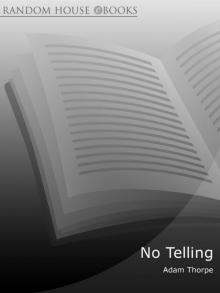 No Telling
No Telling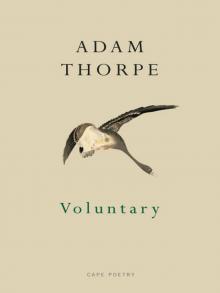 Voluntary
Voluntary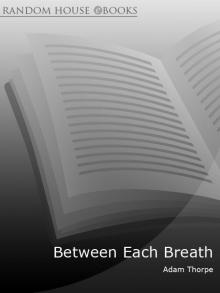 Between Each Breath
Between Each Breath